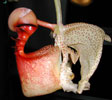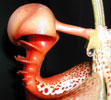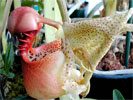|
|
|
|
|
| |
Flasks of
Coryanthes macrantha 'Nhat Lan' × self |
|
| |
|
|
| |
| Number: |
TN3496 |
| Name: |
Coryanthes macrantha 'Nhat Lan' × self
|
| Type: |
self (What's that?) |
|
Seed Donor: |
Mary Bui-Pham
|
|
Click to Enlarge

Pod Parent Flower |
Click to Enlarge

Pod Parent Closeup of Flower |
Click to Enlarge

Pod Parent Flower |
Click to Enlarge

Pod Parent Closeup of Flower |
|
|
|
| |
Culture Notes from Donor: Parent plant: I grow this plant in a very bright greenhouse with temperatures ranging from 50-95°F. The low is the minimum night temperature during the winter, and the high is the maximum day temperature during the summer. This is an easy to grow species if it has enough humidity. This genus can get spider mites in a low humidity environment.
Comments: Parent plant: I think that this is the Venezuela type because of the coloration and the spine, but it may also be the Peru type. Large plant.
For additional origin/habitat information supplied courtesy of
Charles and Margaret Baker, see further below, near the bottom of this page.
|
Temperatures we attempt to use in the lab & greenhouse:
| For Species: |
|
Spring, Summer, Autumn, Winter: days average 88°F, nights 67°F; best fit is Warm-Intermediate 87-64°F
(Source:
Baker's Web OSC) |
|
About the name...
| Etymology of |
Coryanthes |
|
From Greek "korys" helmet; "anthos" flower.
(Source:
Pridgeon 1992) |
| Etymology of |
macrantha |
|
From latinized Greek "macranthus" large-flowered.
(Source:
Mayr & Schmucker 1998) |
| Pronunciation of |
Coryanthes |
|
ko-ree-AN-theez
(Source:
Pridgeon 1992) |
| Pronunciation of |
macrantha |
|
mak-RAN-tha
(Source:
Hawkes 1978) |
|
If you would like to direct someone to this web page, please copy and paste this URL into your email:
http://troymeyers.com/d?013496
| Flask Information |
| Availability: |
We had yield problems with this item, so we didn't continue flasking it. |
| You should: |
Consider placing a "Notify Retries" Request, and if an identical pollination (the same parents) is done again, we'll let you know. |
|
You might also want to:
|
View the seed assay for this item.
View items of the same species.
View items of the same genus.
|
|
|
| |
The origin/habitat information below is supplied courtesy of Charles and Margaret Baker
The following information is based on the name of the plant provided by the donor, and assumes that the name is correct. If the plant has been misidentified, then the following information may not be correct.
This text is copyrighted by the Bakers and may not be reproduced without permission.
ORIGIN/HABITAT: Venezuela, Trinidad, British Guiana, Colombia and Peru. In
Peru, the plants have been found along the Rio Nanay near Iquitos in the
Amazon Basin. In Venezuela, plants were found at about 1500 ft. (560 m)
between the Icabaru and Uaiparu Rivers in the southeastern part of Bolivar
Province. Plants were growing on trees in a fairly dense but not very tall
forest. Some writers feel that the plants found in Peru may represent a
separate species, but they have not been split out at this time. Specific
habitat information was not given, but Coryanthes species are normally
found growing in very acid conditions on the nests of ants.
More about this information and the Bakers...
|
|
|
| |
|
|
|